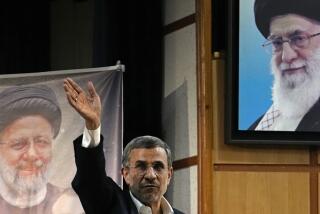Egypt’s leader Abdel Fattah Sisi announces candidacy for president

- Share via
CAIRO — Like an Arabian fable, it was the candidacy of a thousand and one hints.
After months of carefully choreographed suggestions that he would seek the presidency, Field Marshal Abdel Fattah Sisi, the man who toppled Egypt’s first democratically elected president, told the nation Wednesday that he was leaving his military post and embarking on his long-expected campaign.
More than three years after the dizzying uprising against dictator Hosni Mubarak, a former air force commander, Sisi’s announcement sets the country back on the path to which it hewed for decades: strongman leaders drawn from the ranks of the military.
In a televised address to the Egyptian people, wearing his uniform for what he said would be the last time, Sisi called for national unity and emphasized that tough economic times lay ahead. And the 59-year-old military man pointedly sought to dispel the notion that his candidacy turns the presidential campaign into essentially a one-man race.
“No one can force Egyptians to elect a president they don’t want,” he said.
Sisi’s victory, however, is widely considered to be virtually assured. He shot to fame and immense popularity after leading the coup last July against Mohamed Morsi, after enormous public protests demanding the Islamist president’s removal. Assuming the presidency would formalize what has been his de facto leadership for nearly nine months.
During that time, Egypt’s interim government has conducted a sweeping crackdown on Morsi’s Muslim Brotherhood that has expanded to include some secular critics as well: filmmakers, academics, activists and journalists. Human rights groups and Western governments have expressed concern about a variety of repressive measures, including the criminalizing of unsanctioned street protests, the killing more than 1,400 Islamists and the jailing of thousands, many without charges.
This week, Egypt again found itself the target of sharp international criticism after a criminal court sentenced 529 defendants to death in a single case involving the killing of one police officer. Egypt’s chief prosecutor on Wednesday ordered two more mass tribunals for a total of more than 900 suspected Islamists accused of murder.
Sisi’s candidacy and prospective victory present a complex challenge for the Obama administration, which declined to describe Morsi’s removal last year as a coup because it would have triggered an aid cutoff. To restore hundreds of millions of dollars in military aid suspended last year, the administration must assert that progress toward democracy is being made, difficult to do in light of actions like this week’s mass death sentence, which drew international expressions of dismay.
But with aid as the main U.S. leverage, the conundrum is how the White House can persuade Sisi to ease the systematic stifling of dissent. If he considers his power to be fully consolidated upon gaining the presidency, he could choose to give political opponents a bit of breathing room — or crack down even harder.
Only one rival has thus far declared his candidacy, liberal politician Hamdeen Sabahi. Several other prominent political figures have said they would sit out the race, with at least one, former Prime Minister Ahmed Shafik, declaring that the balloting would be a sham.
The interim government has described the upcoming presidential vote, coupled with parliamentary elections later this year and a constitutional referendum that was held in January, as key elements in what it insists is a transition to democracy. The new constitution was endorsed by 97% of voters, with opponents mainly staying away from the polls.
In preparation for leaving the army, Sisi reshuffled top generals and designated his successor as defense minister. In preparation for the announcement of succession, Sisi’s apparent choice, Sedki Sobhi, was elevated to full general.
In some ways, wielding power behind the scenes as defense minister was less complicated for Sisi than the presidency may prove to be. As fervent as his following is now, as president he could become the focus of public discontent over the faltering economy, high unemployment rate, dilapidated infrastructure and unsustainable government subsidies.
Aware of that, Sisi sought to prepare the country for a period of austerity.
“I am not offering miracles, but I am offering unlimited hard work, effort and self-denial,” he said in his 10-minute address. “Know that if I have the honor of leadership, I promise you that together we can, God willing, achieve security, hope and stability for Egypt.”
The timing of the vote remained unclear. At first, it was announced that the balloting would be held by the end of April, but interim President Adly Mansour later said it would take place by mid-July.
Hassan is a special correspondent.
More to Read
Sign up for Essential California
The most important California stories and recommendations in your inbox every morning.
You may occasionally receive promotional content from the Los Angeles Times.













